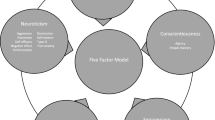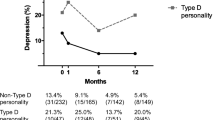Abstract
Objective
The aim of this research was to explore quality of life (QoL), mental health status, type D personality, symptom duration, and emergency admissions of Chinese rectal cancer patients as well as the relationship between these factors.
Methods
Type D personality was measured with the 14-item Type D Personality Scale (DS14). Mental health status was measured with the Hospital Anxiety and Depression Scale (HADS). The QoL outcomes were assessed longitudinally using the European Organization for Research and Treatment of Cancer QLQ-C30 and QLQ-CR38 questionnaires at the baseline and 6 months after diagnosis.
Results
Of the 852 survivors who responded (94 %), 187 (22 %) had a type D personality. The proportion of patients with duration of symptoms >1 month and being diagnosed after emergency admissions in type D group is significantly higher than that in non-type D group. At both of the time points, type D patients reported statistically significant lower scores on most of the functional scales, global health status/QoL scales, and worse symptom scores compared to patients without a type D personality. At the 6-month time point, a higher percentage of patients in the type D group demonstrated QoL deterioration. Clinically elevated levels of anxiety and depression were more prevalent in type D than in non-type D survivors.
Conclusions
Type D personality was associated with poor QoL and mental health status among survivors of rectal cancer, even after adjustment for confounding background variables. Type D personality might be a general vulnerability factor to screen for subgroups at risk for longer symptom duration and emergency admissions in clinical practice.


Similar content being viewed by others
References
Jemal A, Bray F, Center MM, Ferlay J, Ward E, Forman D (2011) Global cancer statistics. CA Cancer J Clin 61:69–90
Chen WQ, Zheng RS, Zhang SW, Zhao P, Zeng HM, Zou XN, He J (2014) Annual report on status of cancer in China, 2010. Chin J Cancer Res 26(1):48–58
How P, Stelzner S, Branagan G, Bundy K, Chandrakumaran K, Heald RJ, Moran B (2012) Comparative quality of life in patients following abdominoperineal excision and low anterior resection for low rectal cancer. Dis Colon Rectum 55:400–6
Signaleringscommissie_kanker, Kanker in Nederland tot 2020; trends en prognoses [Cancer in the Netherlands till 2020; trends and prognoses], 2011.
Mols F, Vingerhoets AJ, Coebergh JW, Vreugdenhil G, Aaronson NK, Lybeert ML, van de Poll-Franse LV (2006) Better quality of life among 10–15 year survivors of Hodgkin's lymphoma compared to 5–9 year survivors: a population-based study. Eur J Cancer 42:2794–2801
Mongin C, Maggiori L, Agostini J, Ferron M, Panis Y (2014) Does anastomotic leakage impair functional results and quality of life after laparoscopic sphincter-saving total mesorectal excision for rectal cancer? A case-matched study. Int J Colorectal Dis 29(4):459–67
Spiegel D (2011) Mind matters in cancer survival. JAMA 305:502–503
Denollet J (2005) DS14: standard assessment of negative affectivity, social inhibition, and Type D personality. Psychosom Med 67:89–97
Pedersen SS, Denollet J (2003) Type D personality, cardiac events, and impaired quality of life: a review. Eur J Cardiovasc Prev Rehab 10:241–8
Schiffer AA, Denollet J, Widdershoven JW, Hendriks EH, Smith OR (2007) Failure to consult for symptoms of heart failure in patients with a Type D personality. Heart 93:814–8
Brostrom A, Stromberg A, Martensson J, Ulander M, Harder L, Svanborg E (2007) Association of Type D personality to perceived side effects and adherence in CPAP-treated patients with OSAS. J Sleep Res 16:439–47
Nefs G, Speight J, Pouwer F, Pop V, Bot M, Denollet J (2015) Type D personality, suboptimal health behaviors and emotional distress in adults with diabetes: results from Diabetes MILES-The Netherlands. Diabetes Res Clin Pract 108(1):94–105
Mols F, Holterhues C, Nijsten T, van de Poll-Franse LV (2010) Personality is associated with health status and impact of cancer among melanoma survivors. Eur J Cancer 46:573–580
Metcalfe MS, Norwood MG, Miller AS, Hemingway D (2005) Unreasonable expectations in emergency colorectal cancer surgery. Colorectal Dis 7(3):275–278
Wong SK, Jalaludin BB, Morgan MJ, Berthelsen AS, Morgan A, Gatenby AH, Fulham SB (2008) Tumor pathology and long-term survival in emergency colorectal cancer. Dis Colon Rectum 51(2):223–230
Bass G, Fleming C, Conneely J, Martin Z, Mealy K (2009) Emergency first presentation of colorectal cancer predicts significantly poorer outcomes: a review of 356 consecutive Irish patients. Dis Colon Rectum 52(4):678–684
Khattak I, Eardley NJ, Rooney PS (2006) Colorectal cancer—a prospective evaluation of symptom duration and GP referral patterns in an inner city teaching hospital. Colorectal Dis 8(6):518–21
Elliss-Brookes L, McPhail S, Ives A (2012) Routes to diagnosis for cancer determining the patient journey using multiple routine data sets. Br J Cancer 107:1220–6
Chie WC, Yang CH, Hsu C, Yang PC (2004) Quality of life of lung cancer patients: validation of the Taiwan Chinese version of the EORTC QLQ-C30 and QLQ-LC13. Qual Life Res 13:257–262
Aaronson NK, Ahmedzai S, Bergman B, Bullinger M, Cull A, Duez NJ, Filiberti A, Flechtner H, Fleishman SB, de Haes JC (1993) The European Organization for Research and Treatment of Cancer QLQ-C30: a quality-of-life instrument for use in international clinical trials in oncology. J Natl Cancer Inst 85:365–376
Sprangers MA, te Velde A, Aaronson NK (1999) The construction and testing of the EORTC colorectal cancer-specifc quality of life questionnaire module (QLQ-CR38). European Organization for Research and Treatment of Cancer Study Group on Quality of Life. Eur J Cancer 35:238–247
Zhao H, Kanda K (2000) Translation and validation of the standard Chinese version of the EORTC QLQ-C30. Qual Life Res 9:129–137
Law CC, Tak Lam WW, Fu YT, Wong KH, Sprangers MA, Fielding R (2008) Validation of the Chinese version of the EORTC colorectal cancer-specifc quality-of-life questionnaire module (QLQ-CR38). J Pain Symptom Manage 35:203–213
Fayers PM, Aaronson NK, Bjordal K, Groenvold M, Curran D, Bottomley A (2001) The EORTC QLQ-C30 Scoring Manual, 3rd edn. European Organisation for Research and treatment of Cancer, Brussels
Olsson I, Mykletun A, Dahl AA (2005) The Hospital Anxiety and Depression Rating Scale: a cross-sectional study of psychometrics and case finding abilities in general practice. BMC Psychiatry 5:46
Carey M, Noble N, Sanson-Fisher R, MacKenzie L (2012) Identifying psychological morbidity among people with cancer using the Hospital Anxiety and Depression Scale: time to revisit first principles? Psycho-Oncology 21(3):229–238
Norman GR, Sloan JA, Wyrwich KW (2003) Interpretation of changes in health-related quality of life: the remarkable universality of half a standard deviation. Med Care 41:582–92
Bartels H, Pedersen SS, van der Laan BF, Staal MJ, Albers FW, Middel B (2010) The impact of Type D personality on health-related quality of life in tinnitus patients is mainly mediated by anxiety and depression. Otol Neurotol 31:11–18
Mols F, Denollet J (2010) Type D personality in the general population: a systematic review of health status, mechanisms of disease, and work-related problems. Health Qual Life Outcomes 8:9
Ken N (1977) Understanding the process of adjustment to disability. In: Stubbins J (ed) Social and psychological aspects of disability: A handbook for practitioners. University Park Press, London, pp 317–324
Schiffer AA, Pedersen SS, Broers H, Widdershoven JW, Denollet J (2008) Type D personality but not depression predicts severity of anxiety in heart failure patients at 1-year follow-up. Journal of Affective Disorders 106:73–81
Spindler H, Kruse C, Zwisler AD, Pedersen SS (2009) Increased anxiety and depression in Danish cardiac patients with a Type D personality: cross-validation of the Type D Scale (DS14). Int J Behav Med 16:98–107
Carr AJ, Gibson B, Robinson PG (2001) Measuring quality of life: Is quality of life determined by expectations or experience? BMJ 322:1240–1243
Downing A, Morris E, Richards M , Corner J, Wright P, Sebag-Montefiore D, Finan P, Kind P, Wood C, Lawton S, Feltbower R, Wagland R, Vernon S, Thomas J, Glaser AW (2015) Health-related quality of life after colorectal cancer in England: a patient-reported outcomes study of individuals 12 to 36 months after diagnosis. J Clin Oncol 33:616–24
Ruan H, You LM (2010) Rectal permanent colostomy survey of patient self-effcacy and impact factors. Chin J Nurse Train (Chin) 25:38–41
Acknowledgments
The authors would like to thank surgeons and general practitioners for their participation in contact with patients. We also thank Zhen Zhang (Department of Biochemistry and Molecular Biology, University of Kansas Medical Center) and Heranmaye C. Prasad (MBBS Candidate 2014, Zhejiang University School of Medicine) for their careful reading and kind suggestion.
Conflict of interest
The authors declare that they have no competing interests.
Authors’ contributions
ZHANG Jia-kui: study concepts, study design, data acquisition and interpretation, manuscript preparation and editing. FANG Li-li: study design and manuscript preparation. ZHANG De-wei: study design and manuscript preparation. JIN Qiu: study design, manuscript preparation and editing. WU Xiao-mei followed up the patients, collected the data, analyzed the data. LIU Ji-chao: followed up the patients, collected the data. ZHANG Chun-dong: data acquisition, manuscript review. DAI Dong-qiu: study concepts, study design, manuscript preparation and editing, manuscript review. All authors have seen the manuscript and approved to submit to your journal.
Author information
Authors and Affiliations
Corresponding author
Rights and permissions
About this article
Cite this article
Zhang, Jk., Fang, Ll., Zhang, Dw. et al. Type D personality is associated with delaying patients to medical assessment and poor quality of life among rectal cancer survivors. Int J Colorectal Dis 31, 75–85 (2016). https://doi.org/10.1007/s00384-015-2333-4
Accepted:
Published:
Issue Date:
DOI: https://doi.org/10.1007/s00384-015-2333-4




